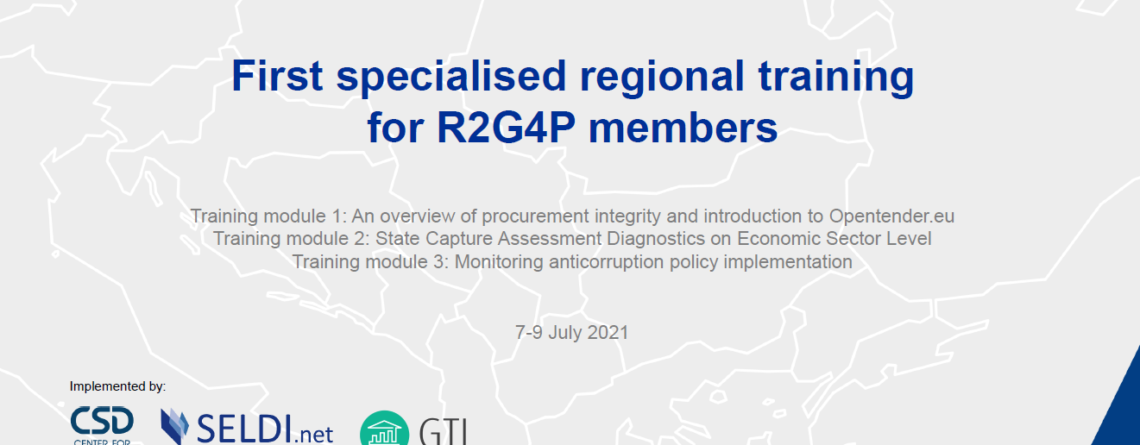The R2G4P project, a spin-off from the SELDI initiative, aims to close the anticorruption policy implementation and public procurement gaps across SEE, and thus amplify the impact of the planned increase in EU infrastructure support until 2025. The activities will be implemented in the framework of a Regional Good Governance Public-Private Partnership Platform (R2G4P), focusing on nine beneficiary countries (Albania, Bosnia and Herzegovina, Bulgaria, Croatia, Hungary, Romania, North Macedonia, Montenegro, and Serbia).
In order to increase the capacity of CSO partners to diagnose and tackle corruption risks, the R2G4P initiative held its first internal three-day regional training on 7-9 July 2021. The training modules were structured around the project’s key methodologies. On 7 July 2021, experts from the Government Transparency Institute (GTI), Hungary made an overview of the most common public procurement integrity issues that countries from the region face, and provided an introduction to Opentender.eu. Opentender.eu is a free of charge platform that allows the visitors to search and analyse tender data from 33 jurisdictions (28 EU member states, Norway, the EU Institutions, Iceland, Switzerland, Georgia). Red flags pointing out to potentially corrupt public procurements include short advertisement periods, biased specifications that exclude companies from applying, the winner being a single bidder, high contracts share of the winner, short decision period, modifying the contract and increasing its value or duration.
On 8 July 2021, CSD and GTI presented their approaches to state capture monitoring and assessment. CSD explained that the State Capture Assessment Diagnostics (SCAD) tool defines “state capture” as an exploitation of the power of government for private benefit in systematic and permanent manner, involving various forms of corruption and illegitimate activities. Thus, state capture could be divided into four dimensions: business capture, political capture, judiciary capture and black market capture. GTI added that state capture could easily be observed through a network analysis of the public procurement relations. Based on the share of corrupt buyers, suppliers and their clusters, a state could be either corruption free; corrupt without state capture; partially appropriated or fully captured. The last day of the training, 9 July 2021, was dedicated to the MACPI (Monitoring Anticorruption Policy Implementation) tool. MACPI provides assessment of individual public institution’s anticorruption policies through quantitative surveys among employees, external experts and clients. It is designed as an internal management tool for the pubic body, used to identify the levels of corruption pressure over its activities and the gaps in the enforcement of its anticorruption policies.
As a next step, the partners will implement the MACPI and Opentender tool and compare the national-level findings in an annual SEE Good Governance Report.
Agenda (7 July 2021)
Agenda (8 July 2021)
Agenda (9 July 2021)


